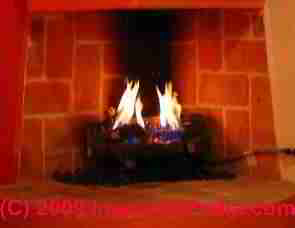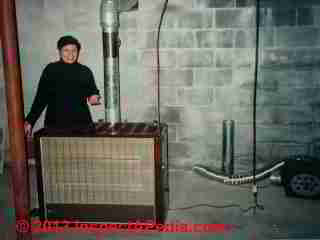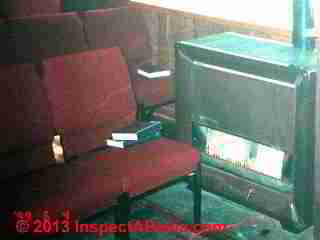 Gas Fireplaces & Gas Space Heater Defects List & Home Inspection Education
Gas Fireplaces & Gas Space Heater Defects List & Home Inspection Education
- POST a QUESTION or COMMENT about home & building inspection courses, standards, & defect checklists for gas fired space heaters
Gas fireplace & gas space heater inspection & defect checklists.
This article lists significant gas heater or gas fireplace defects, definitions, and home inspection education topics.
This article series, beginning at BUILDING DEFECTS LISTS, provides lists of common building defects and basic defect knowledge that also outline recommended curriculum content for home inspector education.
The building defects and inspection points listed in these articles also guide homeowners and home buyers to building areas that merit careful attention and often point areas of safety concern or important maintenance and repair tasks.
InspectAPedia tolerates no conflicts of interest. We have no relationship with advertisers, products, or services discussed at this website.
- Daniel Friedman, Publisher/Editor/Author - See WHO ARE WE?
Home Inspection Education Curriculum - Gas Space Heaters & Fireplaces
 4.8 Gas Space Heaters and Fireplaces Inspection Recommendations & Lists of Defects
4.8 Gas Space Heaters and Fireplaces Inspection Recommendations & Lists of Defects
Safety Warnings about Gas-Log Fireplaces & Gas-Fueled Space Heaters in Buildings
Improper installation, venting, combustion air supply or use of gas or kerosene fired heaters can produce high indoor carbon monoxide(CO) levels.
Watch out: Never go to sleep in an enclosed space with a space heater left operating. In addition to the CO hazards there is a risk of oxygen depletion which can also lead to asphyxiation. Also see Unvented heaters, below.
Tight House conditions can cause dangerous carbon monoxide hazards where gas fired fireplaces or space heaters are in use
Even if previously there were no backdrafting or CO problems at a building, retrofits to improve the energy efficiency of a home can change its air leakage rate and might lead to backdrafting.
- See INDOOR AIR QUALITY & HOUSE TIGHTNESS. In a Best Practices design, all vented combustion appliances should have their own combustion air supplies.
- See COMBUSTION PRODUCTS & IAQ. Atmospherically vented gas appliances such as heaters and water heaters pose special problems because if they backdraft there is little warning and the possible production of carbon monoxide can put lives at risk.
- See COMBUSTION GASES & PARTICLE HAZARDS. Also see VENTILATION, WHOLE HOUSE STRATEGIES.
Unsafe models of space-heating equipment
For some examples see SAFETY RECALLS CHIMNEYS VENTS HEATERS - warning: this is not an exhaustive list
Un-vented heaters or space heaters installed in buildnings
 Un-vented heaters or space heaters, such as "vent-free" fireplaces or gas-log fireplaces. Un-vented appliances are in stunningly wide-spread use and we [DF] found it interesting to read that for at least some "un-vented" gas log fireplaces even the installation instructions specified a requirement for outside combustion air and venting.
Un-vented heaters or space heaters, such as "vent-free" fireplaces or gas-log fireplaces. Un-vented appliances are in stunningly wide-spread use and we [DF] found it interesting to read that for at least some "un-vented" gas log fireplaces even the installation instructions specified a requirement for outside combustion air and venting.
Modern versions of un-vented heaters usually include a sensor that is intended to put out the fire if the oxygen level falls too low.
That approach may not detect CO production at all. In this home in Mexico (photo above left) we observed that it was impossible to operate the gas-log fireplaces without the CO detector alarm sounding even when the carbon monoxide sensor was placed more than 20 feet away from the fireplace.
Incidentally, CO detectors should be installed about 10 feet away from woodstoves, pellet stove, coal stoves, and gas log fireplaces. Not 20 feet as we did.
4.8.1 Knowledge Base for Gas Heaters & Fireplaces: Inspections & Defects
1. Describe the function of gas space heaters and gas fireplaces.
2. Describe the types of gas space heaters including wall furnaces, floor furnaces and room heaters. Highlight the difference between these and forced air furnaces.
3. Describe gas fireplaces and gas logs, highlighting the differences between these and wood burning fireplaces.
4. List the materials and components of each of the systems listed above.
5. Describe the features of good installation and repair technique for each of these systems.
6. Define the following terms with respect to gas space heaters and fireplaces: decorative appliance, radiant system, convective system, vent, unvented appliance, direct vent system, fire stop spacer, inspection cap (for furnace).
7. Identify the code or standards which apply to gas fired space heaters and fireplaces in your area.
4.8.2 Inspection skills for Gas Heaters & Fireplaces: Inspections & Defects
1. Describe the inspection procedure for gas fired space heaters and fireplaces.
2. Identify the following common defects listed on the next page.
3. Describe the implication of each defect.
4. Identify safety issues for the inspector and occupant of the home (gas explosion, electric shock, fire, combustion products poisoning occupants, injury due to moving parts).
5. Communicate findings with client verbally and in writing, recommending corrective action where needed.
Typical Visually-Obserable Gas Fired Space Heater, Room Heater, or Fireplace Defects
 Clearance to combustibles
Clearance to combustibles
- Too close (photo at left)
Combustion Air Hazards
- Possible or obvious inadequate combuation air
- Missing CO or Smoke Detectors
Heat Exchanges in Gas-Fired Space Heaters
• Cracks, holes or rust
• Soot or deposits
• Rusting or dirty
• Scorching
Fan Limit Switch Defectson Gas Fired Space or Room Heaters
• Set wrong or defective
• Improperly wired
• Mechanical damage
• Missing cover
Cabinets: Gas fired space heaters
• Combustible clearances
• Mechanical damage
• Missing components
• Obstructed air intake
• Rust
• Scorching
Inspection Defects Specific to Gas Fired Wall Furnaces
• Ducts added
• Not listed, certified or approved
• Unvented furnace in bedroom or bathroom
• Unvented furnace
Inspection Defects Specific to Floor Furnaces
• Cap missing or damaged
• Firebox cracked or rusted
• Not permitted
• Not listed, certified or approved
• Restricted airflow causing overheating
• Thermostat remote
Common Defects Observable at Room Thermostats Used with Gas Space Heaters or to Control Gas Fireplaces
• Anticipator
• Damaged
• Dirty
• Loose
• Not level
• Poor adjustment or calibration
• Poor location
Defects in Blower Assemblies Used on Gas Fired Space Heaters
• Dirty
• Fan belt loose, worn or damaged
• Inoperative
• Noisy
• Overheating
Inspection Defects Specific to Gas Fired Room Heaters
• Fireplace damper not fixed open
• Not labeled for use in a fireplace
• Unvented
• Poorly secured
• Running continuously
• Rust
• Too small
• Unbalanced or vibration
Inspection Defects Specific to Gas Fireplaces & Gas Logs
• Damper in existing fireplace not fixed open
• Glass door problem
• Not suitable for use in a bedroom or bathroom
• Unvented (may be acceptable ?)
• Asbestos-suspect based on age
Gas Supply Defects at Gas Fired Space Heaters, Room Heaters, Fireplaces
Improper gas piping material
Missing or improperly located gas shutoff valve
Indications of leaks (odors, deposits, complaints)
Readers should see HEATING SYSTEMS for our complete list of articles on this topic. Also see HOME & BUILDING INSPECTORS & INSPECTION METHODS.
Use the Search Box at the top or bottom of these pages to find in-depth information about building, energy savings, and indoor environment inspection, diagnosis and repair at this website.
Watch out: these inspection lists do not list all possible defects for the systems discussed, and not all home or building inspectors will examine all of the items listed here. CONTACT us to suggest corrections or additions to articles at this website.
These curriculae and building defect lists are based on smilar curriculum documents first prepared by Joe Scaduto, an ASHI member who prepared course material for Northeastern University's Building Inspection Certificate program in 1988, subsequently by DF, InspectApedia's editor, for New York University ca 1988 and later, with others, recommended to ASHI, the American Society of Home Inspectors.
The curriculum and lists of defects are informed by additional analysis of the process of home inspection that was developed beginning Calgary, AB for Canadian and U.S. home inspector education and certification examinations in 1997.
Other early contributors to home inspection education in the U.S. and Canada include Dr. Jess Aronstein, Alan Carson, Mike Casey, Mark Cramer, John Cox, Dwight Barnett, Douglas Hansen, Rick Heyl, Larry Hoytt, Bill Merrill, Kevin O'Malley, Dennis Robitalille, Keith Peddie, Pat Porzio, Roger Robinson.
...
Continue reading at FIREPLACES & HEARTHS or select a topic from the closely-related articles below, or see the complete ARTICLE INDEX.
Or see these
Recommended Articles
- CARBON MONOXIDE WARNINGS: HOME HEATERS
- GAS FIREPLACE LOG ASBESTOS
- ASBESTOS in GAS FIREPLACE BACKER
- GAS PIPING, VALVES, CONTROLS
- ANTIQUE HEATERS STILL in USE for an example of an antique but still-used gas fired floor/wall heater
Suggested citation for this web page
DEFECTS LIST - HEAT SPACE & FIREPLACE, GAS at InspectApedia.com - online encyclopedia of building & environmental inspection, testing, diagnosis, repair, & problem prevention advice.
Or see this
INDEX to RELATED ARTICLES: ARTICLE INDEX to BUILDING & HOME INSPECTION
Or use the SEARCH BOX found below to Ask a Question or Search InspectApedia
Ask a Question or Search InspectApedia
Try the search box just below, or if you prefer, post a question or comment in the Comments box below and we will respond promptly.
Search the InspectApedia website
Note: appearance of your Comment below may be delayed: if your comment contains an image, photograph, web link, or text that looks to the software as if it might be a web link, your posting will appear after it has been approved by a moderator. Apologies for the delay.
Only one image can be added per comment but you can post as many comments, and therefore images, as you like.
You will not receive a notification when a response to your question has been posted.
Please bookmark this page to make it easy for you to check back for our response.
IF above you see "Comment Form is loading comments..." then COMMENT BOX - countable.ca / bawkbox.com IS NOT WORKING.
In any case you are welcome to send an email directly to us at InspectApedia.com at editor@inspectApedia.com
We'll reply to you directly. Please help us help you by noting, in your email, the URL of the InspectApedia page where you wanted to comment.
Citations & References
In addition to any citations in the article above, a full list is available on request.
- Eric Galow, Galow Homes, Lagrangeville, NY. Mr. Galow can be reached by email: ericgalow@gmail.com or by telephone: 914-474-6613. Mr. Galow specializes in residential construction including both new homes and repairs, renovations, and additions.
- Mark Cramer Inspection Services Mark Cramer, Tampa Florida, Mr. Cramer is a past president of ASHI, the American Society of Home Inspectors and is a Florida home inspector and home inspection educator. Contact Mark Cramer at: 727-595-4211 mark@BestTampaInspector.com 11/06
- Roger Hankey is principal of Hankey and Brown Inspections, Winter Park, CO. Mr. Hankey is a past chairman of the ASHI Standards Committee and served in other ASHI chapter and national leadership roles. Mr. Hankey is a National Radon Proficiency Program certified measurement professional and a Level II infrared thermographer. Contact Roger Hankey at: 970-393-6604 - rogerhankey47@gmail.com . Website: www.HankeyandBrown.com Mr. Hankey is a frequent contributor to InspectAPedia.com.
- Arlene Puentes [Website: www.octoberhome.com ] , an ASHI member and a licensed home inspector in Kingston, NY, and has served on ASHI national committees as well as HVASHI Chapter President. Ms. Puentes can be contacted at ap@octoberhome.com
- In addition to citations & references found in this article, see the research citations given at the end of the related articles found at our suggested
CONTINUE READING or RECOMMENDED ARTICLES.
- Carson, Dunlop & Associates Ltd., 120 Carlton Street Suite 407, Toronto ON M5A 4K2. Tel: (416) 964-9415 1-800-268-7070 Email: info@carsondunlop.com. Alan Carson is a past president of ASHI, the American Society of Home Inspectors.
Thanks to Alan Carson and Bob Dunlop, for permission for InspectAPedia to use text excerpts from The HOME REFERENCE BOOK - the Encyclopedia of Homes and to use illustrations from The ILLUSTRATED HOME .
Carson Dunlop Associates provides extensive home inspection education and report writing material. In gratitude we provide links to tsome Carson Dunlop Associates products and services.

